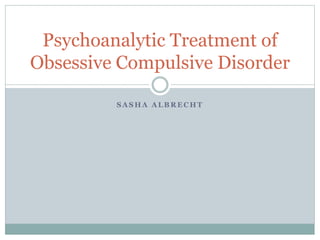
OCD presentation
- 1. S A S H A A L B R E C H T Psychoanalytic Treatment of Obsessive Compulsive Disorder
- 3. DSM-IV •Obsessions or compulsions •Individual has at one point realized that the obsessions or compulsions are excessive or unreasonable •Distressful, excessively time-consuming, or impairing of normal functioning •Symptoms not induced by a substance or another medical condition
- 4. Conventional Treatments Psychotropic Medications • SSRIs • Effective in about 50% of cases • High relapse rates Cognitive Behavioral Therapy • Alter negative meanings attached to obsessions • Exposure therapy • Effective in about 60- 90% of cases • Although most continue to experience mild to moderate symptoms once therapy is completed
- 5. Freud’s Perspective on “Obsessional Neurosis” Inappropriate impulses of the id acting out and/or punishment of a harsh superego Origin: fixation at the anal stage of psychosexual development ≈ Autonomy vs. Shame/Doubt
- 6. Contemporary Psychoanalytic Therapy Ambivalent attachment styleambivalent sense of self Splitting defense mechanism Perfectionism: accentuate the positive aspects of self and hide the negative Therapist: transference/counter-transference corrective emotional experience Accept ambivalence
- 7. Contemporary Psychoanalytic Therapy (cont.) Unconscious meaning attached to symptoms Example: cleaning obsessed son
- 8. Conclusions Psychoanalytic treatment can benefit certain individuals with OCD, including those whose symptoms may be physical manifestations of unconscious conflict. May be a suitable alternative for individuals who are not benefitting from traditional treatment options.
Editor's Notes
- http://focus.psychiatryonline.org/data/Journals/FOCUS/2695/foc00307-2078-t01.jpeg
- http://www.loc.gov/exhibits/freud/images/maresfie.jpg
- http://www.cleaningsuppliesexposed.com/wp-content/uploads/2010/03/cleaning-supplies.jpg